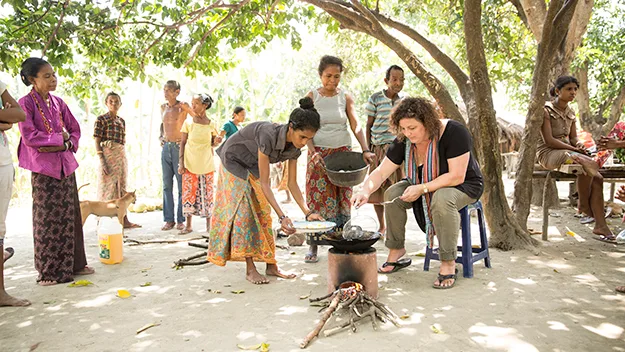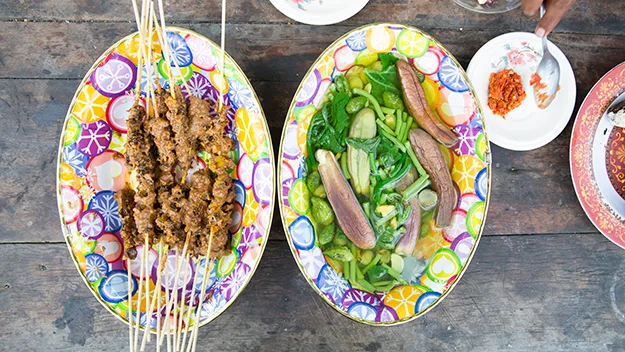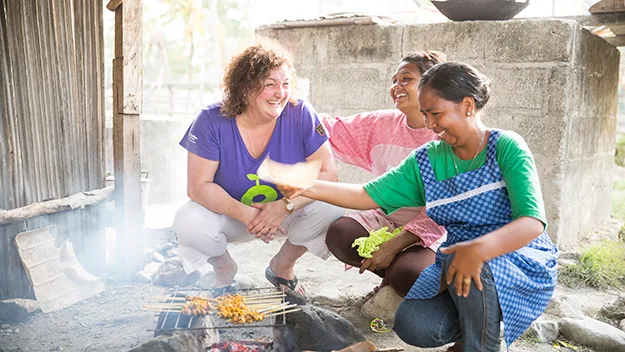On my recent trip to Timor Leste with Oxfam Australia I got to see and hear first-hand, the effects of climate change on the people there. It was officially the end of the wet season — but there had been no rain. The ground was bone-dry and hard as cement.
The farmers talked to me about how the seasons are changing. There is a new uncertainty in weather patterns that wasn’t there for previous generations. And this isn’t just the case in Timor Leste — around the world, extreme weather and unreliable seasons are playing havoc with farmers’ crops and livelihoods.
With great tenacity, the people in Timor Leste are adapting; programs run by Oxfam and their partners are helping them become more resilient to climate change. I visited two community gardens, where I witnessed crop diversification which is bolstering the ability of the communities to support themselves. For instance, the lack of rain has caused the corn crop to fail – but there is a thriving patch of eggplants.

Julie Goodwin cooking, Bonnie Savage/Oxfam.
Diversifying the crops not only means that communities are less vulnerable to changing weather conditions. It also means there is more variety in what can be sold at market, which means a better price can be negotiated than if everyone has the same thing to sell.
I also helped to harvest snails for consumption. In this particular community, previous generations these have been considered poison, but now the locals know that they are edible, they provide another valuable source of food.
Cooking with the women of Timor Leste was a great privilege. In the village of Espy 2, I was taught how to turn cassava and bananas into snacks that can be stored for longer than their freshly-harvested counterparts.
In developing countries, most of the food waste occurs at the production end of the food line due to an absence of storage facilities, and difficult transportation.
This is different to developed countries, where the food is able to reach the market but is often wasted at the consumer end. So, being able to produce food products like cassava chips, means that food can be stored and transported rather than spoiling and going to waste.

Dishes: Bonnie Savage/Oxfam.
It is wonderful to see the work of Oxfam and its partners in a country that is so vulnerable to the changing weather conditions and increasing extreme weather events.
This work will continue to build the resilience of the Timorese people and allow them to better support themselves through the coming challenging times.
But there are actions all of us can take every day to help too.
We can lobby our leaders to be more ambitious in reducing Australia’s emissions, and to continue to support communities to adapt to their changing climate. And we can be pushing food companies to also take greater responsibility for reducing emissions.
We can take everyday steps to prevent waste and reduce our own carbon footprint. We can join Oxfam’s GROW! Campaign to keep ourselves informed of the issues.

Photography credit: Bonnie Savage/Oxfam.
I left Timor Leste with a renewed respect for the people who spend their lives working on the land to sustain their families and communities. Their positivity, their creativity and their perseverance are all things that I will remember and draw on in my own life.
It also gives me renewed determination to make good decisions in my daily life that will contribute to the solution rather than adding to the problem. And I have a strengthened sense of the responsibility that we all, as humans sharing one planet, have to each other.
The climate is changing. The responsibility lies with each of us to do our part to make sure that everyone has enough to eat, always.
By Julie Goodwin is Oxfam Australia’s GROW ambassador.
Oxfam’s briefing paper, ‘Hot and Hungry: How to stop climate change derailing the fight against hunger’, analyses 10 key factors that will have an increasingly important influence on countries’ ability to feed their people in a warming world.
It finds that climate change could put back the fight against hunger by decades and our global food system is woefully unprepared to cope with the challenge.


